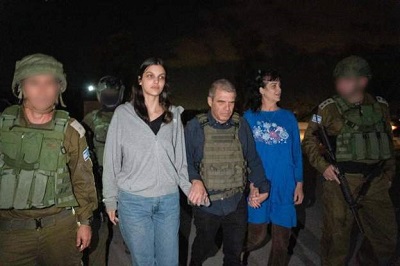Washington, (Samajweekly) Qatar, a tiny Persian Gulf nation with an abundance of natural gas reserves, is playing a pivotal role as a key negotiator to secure the release of Hamas-held hostages and fulfilling its long-cherished desire for prestige on the world stage. On the flip side, its close ties with Hamas are also coming under scrutiny from the West.
Qatar has become a main intermediary in negotiations supported by the Arabs in Saudi Arabia, Egypt, and the UAE with the US and Israel to secure the early release of more than 200 hostages captured by Hamas in its attack on Israel on October 7. Four have already been freed. The IDF rescued another earlier this week, media reports said .
Qatari mediators also put through a deal allowing for limited evacuations of foreign passport holders and some critically injured people from the Gaza Strip, which Israel has been pounding with air strikes since the Hamas attack last month, USA TODAY said.
Qatar, one of the richest Gulf nations and third on the list of most gas reserves after Russian and Iran, is seeking to boost its image on the world stage, said Bruce Riedel of the Brookings Institution’s Center for Middle East Policy. “Qatar wants to be a player at the same height as the Saudis or Egypt.”
Qatar sits on a peninsula jutting into the Persian Gulf with a sparse population of just 2.7 million, but most of its residents are expatriates. Just 300,000 are Qatari citizens.
Over 1,000 people, including more than 100 Americans, have already exited the besieged territory through the Rafah border crossing between Egypt and Gaza under a Qatar-brokered deal with the militants. More departures are expected. How did Qatar, a wealthy Arab state that’s just a speck on maps of the Middle East, find itself thrust in the middle of international diplomacy? asked a USA TODAY commentator in Sunday pages of the widely-circulated dailiy.
“Qatar is looked upon favourably enough by both Hamas and Israel to be willing to engage with them on things like humanitarian issues,” said Jonathan Panikoff, an expert on Middle Eastern affairs with the Atlantic Council, a non-partisan think tank based on Washington.
Qatari officials have been working furiously holding talks with Hamas, Israeli and US officials to strategise on the release of the hostages. David Barnea, head of Israel’s intelligence agency Mossad, has reportedly been in Qatar as part of the discussions. Mediators for Qatar have been shuttling between Mossad’s Barnea and Hamas leaders to try to secure the hostages’ release, media reports said .
“Qatar has lines of communication with Hamas that almost nobody else has,” said John Kirby, the White House’s spokesman for national security issues.
“Qatar is becoming an essential party and stakeholder in the facilitation of humanitarian solutions,” Tzachi Hanegbi, Israel’s national security chief, wrote on X. “Qatar’s diplomatic efforts are crucial at this time,” he said.
This is not a first for Qatar that helped secure the release earlier this year of four Ukrainian children held by Russia. The US ally helped secure the release in 2014 of an American journalist, Peter Theo Curt, who had been held in Syria for two years.
Qatar played a key role in evacuating refugees from Afghanistan two years ago, as US military withdrew after the Taliban seized power ending a decade-long war. Taliban has an office in Qatar.
Qatar put through the crucial prisoner swap between US and Iran agreeing to release $6 billion in Iranian oil assets frozen in South Korean banks to be transferred to Doha for Iran to access them for the purchase of humanitarian goods. After the Hamas attack, however, Qatar and the US decided that Iran would not be allowed to access the funds for now, USA TODAY said as US is suspicious of Iran’s intentions to use the funds amid reports it was instigating the militant Hezbollah to strike Iran. .
On the flip side, Qatar’s role in the Gaza hostage discussions has raised eyebrows because of its ties to Hamas, which the US considers a terrorist organization. Qatar is home for the Hamas’ senior leaders in exile, including Khalid Mashaal and Ismail Haniyeh, sanctioned by the US in 2003 for a role in “supervising assassination operations, bombings and the killing of Israeli settlers”. Haniyeh was sanctioned in 2018 for “close links with Hamas’ military wing”.
Qatar has for years also subsidised the salaries of public employees, including teachers and doctors, in Gaza under a informal barter brokered by Egypt. Qatar has transferred some $1.5 billion over the past decade to Gaza, under a blockade by Israel and Egypt since Hamas seized power from rival Palestinian forces in 2007.
Hamas militants attacked Israel on October 7, killing more than 1,400 people, kidnapping more than 200 hostages and sparking a war leading to the death of 9,000 Palestinians as estimated by the Hamas-run Health Ministry.









